虚拟语气句型及其表现形式
虚拟语气的八种情况

No.1虚拟语气的常见类型和句型(1)由wish引起的表示愿望的虚拟语气A.用wish表示对现在的愿望时,它所引起的宾语从句中谓语动词形式为:过去式(be动词用were)。
B.用wish表示对将来的愿望时,它所引起的宾语从句中谓语动词形式为:would, could, might+ 动词原形。
C.wish用于对过去的事实表示一种不可能实现的愿望时,宾语从句中的谓语动词形式为:had+动词过去分词或could, would + have +动词过去分词。
The picture exhibition bored me to death; I wish I had not gone to it.---“I let Joe borrow our radio for the afternoon.”---“That’s all right, but I wish he would buy one of his own.”I wish that he weren’t so lazy.(2)had hoped引起的宾语从句中备用语动词形式为would+动词原形,表示一种过去未实现的愿望或令人失望的事。
His father had hoped that his son would go to business with him, but his son became an artist later.(3)would (had) rather, would as soon, would sooner和would prefer所引起的从句中要求用过去式表示当时或将来的情况,用过去完成时表示过去的情况,表示希望或婉转的责备。
例如:I’d rather you posted the letter right away. 我倒希望你把这封信立刻寄出去。
I would prefer he didn’t stay there too long.我倒希望他不要在那儿可得太久。
常见的虚拟语气句型
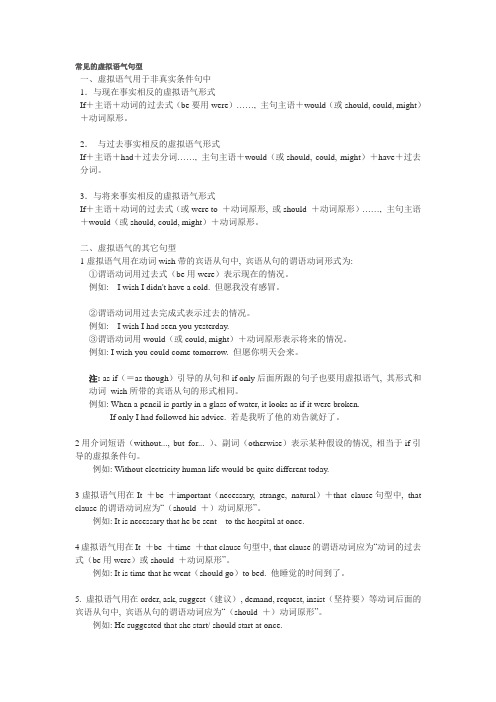
常见的虚拟语气句型一、虚拟语气用于非真实条件句中1.与现在事实相反的虚拟语气形式If+主语+动词的过去式(be要用were)……, 主句主语+would(或should, could, might)+动词原形。
2.与过去事实相反的虚拟语气形式If+主语+had+过去分词……, 主句主语+would(或should, could, might)+have+过去分词。
3.与将来事实相反的虚拟语气形式If+主语+动词的过去式(或were to +动词原形, 或should +动词原形)……, 主句主语+would(或should, could, might)+动词原形。
二、虚拟语气的其它句型1虚拟语气用在动词wish带的宾语从句中, 宾语从句的谓语动词形式为:①谓语动词用过去式(be用were)表示现在的情况。
例如: I wish I didn't have a cold. 但愿我没有感冒。
②谓语动词用过去完成式表示过去的情况。
例如: I wish I had seen you yesterday.③谓语动词用would(或could, might)+动词原形表示将来的情况。
例如: I wish you could come tomorrow. 但愿你明天会来。
注: as if(=as though)引导的从句和if only后面所跟的句子也要用虚拟语气, 其形式和动词wish所带的宾语从句的形式相同。
例如: When a pencil is partly in a glass of water, it looks as if it were broken.If only I had followed his advice. 若是我听了他的劝告就好了。
2用介词短语(without..., but for... )、副词(otherwise)表示某种假设的情况, 相当于if引导的虚拟条件句。
例如: Without electricity human life would be quite different today.3虚拟语气用在It +be +important(necessary, strange, natural)+that clause句型中, that clause的谓语动词应为“(should +)动词原形”。
新概念英语第二册语法总结:虚拟语气
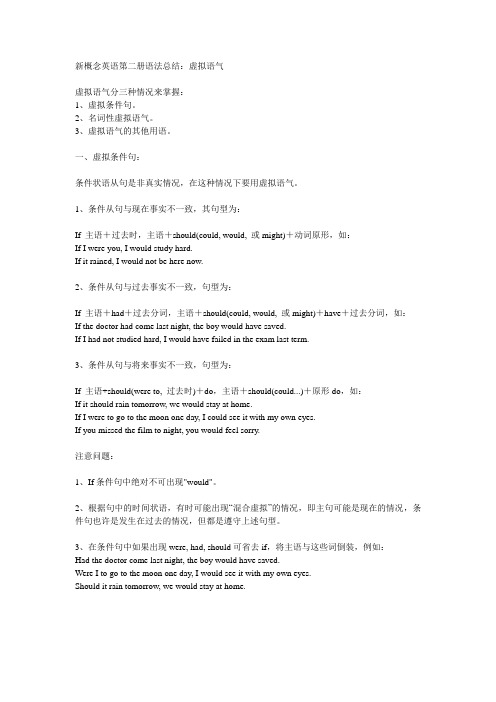
新概念英语第二册语法总结:虚拟语气虚拟语气分三种情况来掌握:1、虚拟条件句。
2、名词性虚拟语气。
3、虚拟语气的其他用语。
一、虚拟条件句:条件状语从句是非真实情况,在这种情况下要用虚拟语气。
1、条件从句与现在事实不一致,其句型为:If 主语+过去时,主语+should(could, would, 或might)+动词原形,如:If I were you, I would study hard.If it rained, I would not be here now.2、条件从句与过去事实不一致,句型为:If 主语+had+过去分词,主语+should(could, would, 或might)+have+过去分词,如:If the doctor had come last night, the boy would have saved.If I had not studied hard, I would have failed in the exam last term.3、条件从句与将来事实不一致,句型为:If 主语+should(were to, 过去时)+do,主语+should(could...)+原形do,如:If it should rain tomorrow, we would stay at home.If I were to go to the moon one day, I could see it with my own eyes.If you missed the film to night, you would feel sorry.注意问题:1、If条件句中绝对不可出现"would"。
2、根据句中的时间状语,有时可能出现“混合虚拟”的情况,即主句可能是现在的情况,条件句也许是发生在过去的情况,但都是遵守上述句型。
3、在条件句中如果出现were, had, should可省去if,将主语与这些词倒装,例如:Had the doctor come last night, the boy would have saved.Were I to go to the moon one day, I would see it with my own eyes.Should it rain tomorrow, we would stay at home.二、名词性虚拟语气:在表示命令、建议要求、惊叹时的名词性从句中需用虚拟语气,基本句型:主语+(should)+动词原形,如:Mother insisted that John go to bed at 9 o'clock.(宾语从句)We suggested that the meeting should not be held.It was required that the crops should be harvested at once.(主语从句)The suggestion that he be invited was rejected.(同位语从句)That is their demand that their wages be increased.(表语从句)注意:在这种句子中绝不出现"would""must""could"等。
虚拟语气完整用法
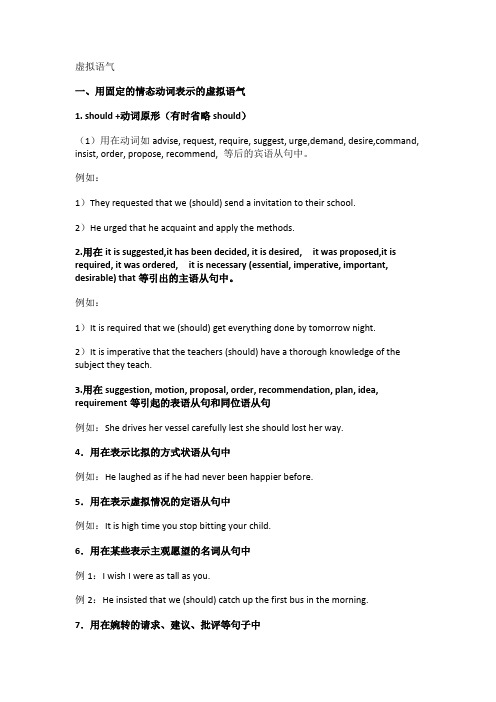
虚拟语气一、用固定的情态动词表示的虚拟语气1. should +动词原形(有时省略should)(1)用在动词如advise, request, require, suggest, urge,demand, desire,command, insist, order, propose, recommend, 等后的宾语从句中。
例如:1)They requested that we (should) send a invitation to their school.2)He urged that he acquaint and apply the methods.2.用在it is suggested,it has been decided, it is desired, it was proposed,it is required, it was ordered, it is necessary (essential, imperative, important, desirable) that等引出的主语从句中。
例如:1)It is required that we (should) get everything done by tomorrow night.2)It is imperative that the teachers (should) have a thorough knowledge of the subject they teach.3.用在suggestion, motion, proposal, order, recommendation, plan, idea, requirement等引起的表语从句和同位语从句例如:She drives her vessel carefully lest she should lost her way.4.用在表示比拟的方式状语从句中例如:He laughed as if he had never been happier before.5.用在表示虚拟情况的定语从句中例如:It is high time you stop bitting your child.6.用在某些表示主观愿望的名词从句中例1:I wish I were as tall as you.例2:He insisted that we (should) catch up the first bus in the morning.7.用在婉转的请求、建议、批评等句子中例1:Could you hand me some pepper例2:You might have told me earlier.例3:Hadn’t you better go and see you lover8.用在表示祝愿的简单句中例1:Long live world peace.例2:May you best.二.虚拟语气谓语动词的几种表现形式:1.用于虚拟条件句中虚拟条件句及其主句的谓语形式可归纳如下:从句谓语主句谓语与现在事实相反were, did would (should, could, might) + v.与将来事实相反should do, would (should, could, might) + v.(可能性极小)were+to+v.与过去事实相反had done would (should, could, might) + have done例1:I could definitely see the final score if I had the time.例2:How nice it would be if you could bring a gift.例3:Thay might have arrived on time if the car haven’t broken down on the road.如果条件从句中包含有were, had, should或could,有时可把if省略掉,但这时要把were, had, should或could放在主语前面(这种结构在口语中较少使用)。
虚拟语气句型及其表现形式
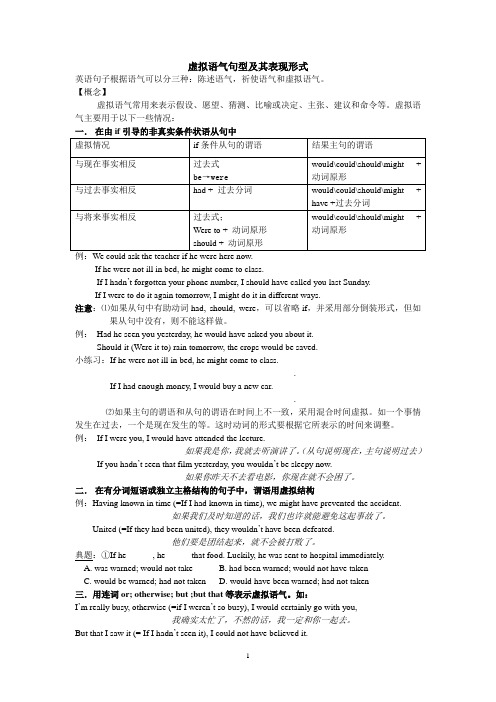
虚拟语气句型及其表现形式英语句子根据语气可以分三种:陈述语气,祈使语气和虚拟语气。
【概念】虚拟语气常用来表示假设、愿望、猜测、比喻或决定、主张、建议和命令等。
虚拟语气主要用于以下一些情况:一.在由if引导的非真实条件状语从句中If he were not ill in bed, he might come to class.If I hadn’t forgotten your phone number, I should have called you last Sunday.If I were to do it again tomorrow, I might do it in different ways.注意:⑪如果从句中有助动词had, should, were,可以省略if,并采用部分倒装形式,但如果从句中没有,则不能这样做。
例:Had he seen you yesterday, he would have asked you about it.Should it (Were it to) rain tomorrow, the crops would be saved.小练习:If he were not ill in bed, he might come to class.__________________________________________.If I had enough money, I would buy a new car.__________________________________________.⑫如果主句的谓语和从句的谓语在时间上不一致,采用混合时间虚拟。
如一个事情发生在过去,一个是现在发生的等。
这时动词的形式要根据它所表示的时间来调整。
例:If I were you, I would have attended the lecture.如果我是你,我就去听演讲了。
高中英语虚拟语气的十大句型

高中英语虚拟语气的十大句型虚拟条件句:条件状语从句是非真实情况,在这种情况下要用虚拟语气。
1.条件从句与现在事实不一致,其句型为:句型1:If +主语+过去时,主语+should (could, would, 或might) +动词原形(1) If I were you, I would study hard.(2) If it rained, I would not be here now.2.条件从句与过去事实不一致,其句型为:句型2:If +主语+had+过去分词,主语+should(could, would, 或might)+have +过去分词(3) If the doctor had come last night, the boy would have been saved.(4) If I had not studied hard, I would have failed in the exam last term.3.条件从句与将来事实不一致,其句型为:句型3:If +主语+过去时/ should +动词原形/ were to+动词原形,主语+should (could, would, 或might) +动词原形(5) If it should rain tomorrow, we would stay at home.(6) If I were to go to the moon one day, I could see it with my own eyes.(7) If you missed the film tonight, you would feel sorry.注意问题:1.If条件句中绝对不可以出现would。
2.根据句中的时间状语,有时可能出现“混合虚拟”的情况,即主句可能是现在的情况,条件句也许是发生在过去的情况,但都要遵守上述句型。
如:(8) If you had studied hard before, you would be a college student now and you would graduate from a college in four years’time. 3.条件句中如果出现were, had, should可省去if,将主语与这些词倒装。
高中英语知识点归纳虚拟语气的用法及常见句型

高中英语知识点归纳虚拟语气的用法及常见句型高中英语知识点归纳:虚拟语气的用法及常见句型引言:英语语法中,虚拟语气是一种特殊的语态,在表达假设、愿望、建议、命令等方面非常常见。
了解虚拟语气的用法和常见句型可以帮助学生在英语交流中更准确地表达自己的意思。
本文将介绍虚拟语气的基本用法和常见的句型。
一、与现在事实相反的虚拟语气1. 形式:if + 动词的过去式,主句用“should/could/would/might + 动词原形”形式。
例如:If I were you, I would tell her the truth.(如果我是你,我会告诉她真相)2. 常见句型:a. It's time (that) + 主语 + 过去式。
(是时候…了。
)例如:It's time that we left for the airport.(是时候我们离开机场了。
)b. If only + 主语 + 过去式 or 过去完成式。
(要是…就好了。
)例如:If only he had listened to my advice!(要是他听了我的建议就好了!)c. I wish/If only + 主语 + 过去式 or 过去完成式。
(我希望…)例如:I wish I had more time to study.(我希望我有更多时间学习。
)二、与过去事实相反的虚拟语气1. 形式:if + 主语 + had + 过去分词,主句用“should/might + have + 过去分词”形式。
例如:If he had known about the party, he would have come.(如果他知道派对的话,他就会来的。
)2. 常见句型:a. If it had not been for + 名词,主语 + would/could/might not have + 过去分词.(如果不是因为…)例如:If it had not been for your help, I would not have passed the exam.(如果不是因为你的帮助,我不会通过考试的。
高中英语虚拟语气用法详解

⾼中英语虚拟语⽓⽤法详解虚拟语⽓语⽓(mood)也是动词的⼀种形式变化。
这和中⽂中的语⽓是不⼀样的。
它表⽰说话者对所指的动词或状态所持的态度,⽽且,在谓语动词上有所体现,⽽中⽂没有体现。
语⽓可分为三种:陈述语⽓、祈使语⽓和虚拟语⽓。
虚拟语⽓(the Subjunctive Mood)表⽰说的话不是事实,或者是不可能发⽣的情况,⽽是⼀种愿望、建议或与事实相反的假设等。
⼀、虚拟条件句1.主句和从句都与现在事实相反时,从句⽤⼀般过去时,be的形式要⽤were,主句⽤would/could/ should/might+不定式⼀般式。
If I were you, I should not go with him.2.主句和从句都与过去事实相反时,从句⽤过去完成时,主句⽤would/should/could/might+不定式完成式。
If I had tried hard last term, I would have succeeded.3.当主句和从句都与将来事实相反,或指不⼤可能发⽣的事的时候,从句和与现在事实相反的从句时态相同,或⽤should/were to+不定式⼀般式,主句和与现在事实相反的主句相同。
If it rained/were to rain/should rain tomorrow, the match would be put off.4.在使⽤虚拟条件句时,由于语⾔环境的千差万别,各种时间关系混合使⽤是很常见的。
如果逻辑上讲得通,主句和从句的动词时态可进⾏各种各样的搭配。
If it hadn't rained those days, (从句与过去事实相反)1 work would be finished next week. (主句与将来事实相反)2.here wouldn't be any water in the river now. (主句与现在事实相反)⼀、语⽓及其种类1.语⽓(mood)语⽓是⼀种动词形式,表⽰讲话⼈对某⼀⾏为或事情的看法和态度。
虚拟语气的用法和表示方式
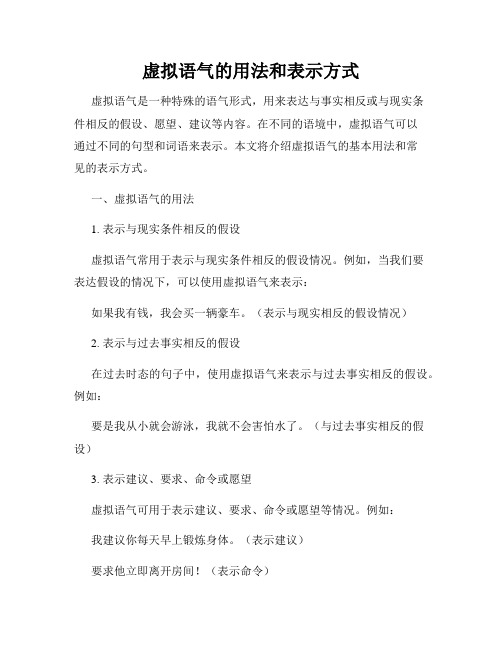
虚拟语气的用法和表示方式虚拟语气是一种特殊的语气形式,用来表达与事实相反或与现实条件相反的假设、愿望、建议等内容。
在不同的语境中,虚拟语气可以通过不同的句型和词语来表示。
本文将介绍虚拟语气的基本用法和常见的表示方式。
一、虚拟语气的用法1. 表示与现实条件相反的假设虚拟语气常用于表示与现实条件相反的假设情况。
例如,当我们要表达假设的情况下,可以使用虚拟语气来表示:如果我有钱,我会买一辆豪车。
(表示与现实相反的假设情况)2. 表示与过去事实相反的假设在过去时态的句子中,使用虚拟语气来表示与过去事实相反的假设。
例如:要是我从小就会游泳,我就不会害怕水了。
(与过去事实相反的假设)3. 表示建议、要求、命令或愿望虚拟语气可用于表示建议、要求、命令或愿望等情况。
例如:我建议你每天早上锻炼身体。
(表示建议)要求他立即离开房间!(表示命令)愿你新年快乐!(表示愿望)二、虚拟语气的表示方式1. 使用虚拟词或词组在表示虚拟语气时,常使用一些特定的虚拟词或词组。
例如:如果、要是、假如、希望、愿望、祝愿等。
如果我是你,我会抓住这个机会。
(使用“如果”引导虚拟语气)我希望他能够及时赶到。
(使用“希望”表示虚拟语气)2. 使用过去式或过去完成式在表示与现实条件相反的假设时,可以使用过去式或过去完成式来表示虚拟语气。
例如:如果他不忘记带护照,他就能出境了。
(使用过去式表示虚拟语气)要是你早点告诉我,我就不会错过这个机会了。
(使用过去完成式表示虚拟语气)3. 使用虚拟语气的情态动词情态动词可以用来表示虚拟语气的情况。
例如:如果我能飞,我就能飞到世界的另一端去。
(使用“能”表示虚拟语气)如果我愿意,我就参加明天的会议。
(使用“愿意”表示虚拟语气)综上所述,虚拟语气是一种用来表达与事实相反或与现实条件相反的假设、愿望、建议等内容的语气形式。
其使用方式包括使用虚拟词或词组、使用过去式或过去完成式以及使用虚拟语气的情态动词等。
掌握虚拟语气的用法和表示方式有助于提高语言表达的灵活性和准确性,同时也能使语言更加丰富。
虚拟语气的用法与句型

虚拟语气的用法与句型虚拟语气是指在句子中表达一种假设、愿望、建议、命令等非真实情况的语气。
它在表达的内容上与现实相悖,用于描述与实际情况相反或与现在事实相反的假想情况。
虚拟语气在汉语中分为虚拟条件和虚拟假设两种情况。
本文将详细介绍虚拟语气的用法和常见句型。
一、表示假设的虚拟条件句型1. 如果引导的条件句条件句使用“如果+主语+动词”的结构,表示与实际情况相反的假设。
举例:如果我会飞,我就飞到天空中。
如果你能去,我们就一起去旅行。
如果明天下雨,我就不去跑步了。
2. 要是引导的条件句条件句使用“要是+主语+动词”的结构,表示与实际情况相反的假设。
举例:要是你在这里,我就不会感到孤单。
要是他努力学习,他就可以考上大学。
要是明天放假,我就会去看电影。
3. 假如引导的条件句条件句使用“假如+主语+动词”的结构,表示与实际情况相反的假设。
举例:假如我是你,我就不会这样选择。
假如我有足够的时间,我就会旅行。
假如天气好,我们就可以去海边玩。
二、表示愿望的虚拟条件句型1. 祈使句+“但愿(希望)”句型使用祈使句来表达对未来情况的愿望,后接“但愿(希望)”引导的句子,表示非真实情况的愿望。
举例:多带雨伞,但愿今天不下雨。
早点回家,但愿家里没人。
努力学习,但愿能考好成绩。
2. 希望/愿望+“(能)+动词原形”使用希望或愿望来表达对未来情况的期望,后接能否+动词原形,表示非真实情况的愿望。
举例:我希望明天不下雨。
我希望他能来参加我的生日派对。
我希望你明天能早点到公司。
三、表达建议的虚拟条件句型1. 建议/要求/命令+“(应该)+动词原形”使用建议、要求或命令来表达对他人的建议,后接“应该”引导的句子,表示非真实情况的建议。
举例:你应该多锻炼身体,这样会更健康。
你应该早点睡觉,这样明天才能精神饱满。
上班迟到是不对的,你应该注意时间。
2. 要是/如果+动词过去式使用要是或如果来引导一个非真实情况的条件句,表示一种建议或建议的情感色彩。
虚拟语气的用法和常见句型
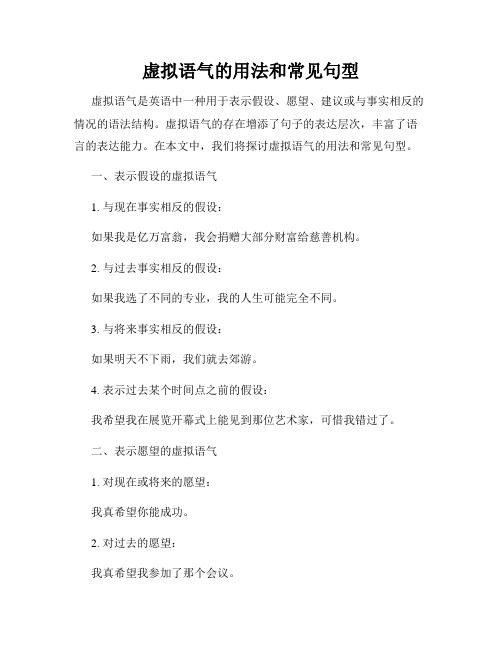
虚拟语气的用法和常见句型虚拟语气是英语中一种用于表示假设、愿望、建议或与事实相反的情况的语法结构。
虚拟语气的存在增添了句子的表达层次,丰富了语言的表达能力。
在本文中,我们将探讨虚拟语气的用法和常见句型。
一、表示假设的虚拟语气1. 与现在事实相反的假设:如果我是亿万富翁,我会捐赠大部分财富给慈善机构。
2. 与过去事实相反的假设:如果我选了不同的专业,我的人生可能完全不同。
3. 与将来事实相反的假设:如果明天不下雨,我们就去郊游。
4. 表示过去某个时间点之前的假设:我希望我在展览开幕式上能见到那位艺术家,可惜我错过了。
二、表示愿望的虚拟语气1. 对现在或将来的愿望:我真希望你能成功。
2. 对过去的愿望:我真希望我参加了那个会议。
三、表示建议的虚拟语气1. 建议:他建议我尽早去见医生。
2. 要求:老师要求我们每天完成作业。
四、常见的虚拟语气句型1. If only... (要是...该多好)If only I were younger, I could join the marathon.(要是我年轻些就好了,我就可以参加马拉松了。
)2. It's time... (是时候...了)It's time we started planning for our summer vacation.(是时候我们开始为暑假计划了。
)3. I wish... (我希望...)I wish I had more time to spend with my family.(我希望我有更多时间陪伴家人。
)4. Suppose... (假设...)Suppose it rains tomorrow, what should we do?(假设明天下雨了,我们该怎么办?)5. If it were not for... (要不是因为...)If it were not for your help, I wouldn't have finished the project on time.(要不是因为你的帮助,我不会按时完成这个项目。
虚拟语气'四种形式'及'三点注意'

虚拟语气“四种形式”及“三点注意新疆哈密石油高级中学常玉国刘雪娟虚拟语气,作为日常交际应用中常常出现的一种语言现象,一直是高考题几乎年年都要考到的一个热点,但对于中国学生来说,它又是一个难点。
无怪乎许多同学在学完虚拟语气后,常常会叹道:If there were no subjunctive mood ,English would be easier.本文结合笔者多年教学实践,以历年高考题为例证,谈谈学好虚拟语气需要掌握好的“四种形式”和“三点注意”。
一、掌握虚拟语气的四种主要形式为了理解与记忆的方便,我们把常见的虚拟语气现象归纳为以下四类:(一)条件句+主句这是虚拟语气最常见的形式,依据表现时间的不同,又可分为表1所示几种形式。
形式虽多,但较规范,可依据上下文的提示解题:表1:“条件从句+主句”的虚拟形式例1:The rice______if you had been more careful.A. would not be burningB. would not burnC. would not have burntD. would not burnt从if条件句中我们可以判断这是对过去的虚拟,对照上表,选择C(注:从句可在主句前,亦可在主句后)。
例2:If my lawyer____ here last Saturday, he_____ me from going.(MET89)A. had been ;would have prevented.B. had been; would preventedC. were; would preventD. were; would have prevented从last Saturday 我们可知道这是对过去的虚拟,对照上表,此题选A。
例3:I didn’t see your sister at the meeting. If she______ she would have met my brother. (MET94)A. has comeB. did comeC. cameD. had come从上文I didn’t see的陈述中,我们可看出she并没来,且下文主句中的would have met 亦给了我们足够的补充,据上表则选D。
虚拟语气讲解(整理)

(3)虚拟语气在 在主语从句中
A.在句型 “It is important (necessary, strange, natural) that .... ” 中,that 后面的从句中的谓语动词 用: should + 动词原形
1. 我们有必要出去散散步。 It’s necessary that we should have a walk now.
2.用于表示命令、建议、要求等一类词后面的宾语从句。 insist, order, command, suggest, advise, propose, require, request, demand, desire etc.
We suggested that the meeting (should) be put off.
7. It is of the utmost importance that you ______ here on time. a. be b. shall be c. are to be d. must be
三、虚拟语气在其他从句中
1. It is (high / about ) time that…从句中的谓 语动词用过去式或should+动词原形,should 不能省略. It is high time that you went / should go to school.
I would rather you told me the truth. I would rather you had gone there last Sunday.
4. as if ( as though) 看起来 常用虚拟形式,即 表示与现在事实相反,用过去式;与过去事实相反 用过去完成式 (had done).
虚拟语气三个基本句型
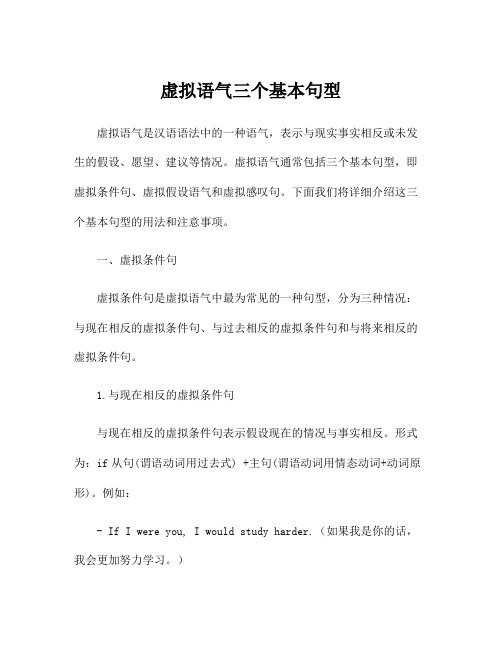
虚拟语气三个基本句型虚拟语气是汉语语法中的一种语气,表示与现实事实相反或未发生的假设、愿望、建议等情况。
虚拟语气通常包括三个基本句型,即虚拟条件句、虚拟假设语气和虚拟感叹句。
下面我们将详细介绍这三个基本句型的用法和注意事项。
一、虚拟条件句虚拟条件句是虚拟语气中最为常见的一种句型,分为三种情况:与现在相反的虚拟条件句、与过去相反的虚拟条件句和与将来相反的虚拟条件句。
1.与现在相反的虚拟条件句与现在相反的虚拟条件句表示假设现在的情况与事实相反。
形式为:if从句(谓语动词用过去式) +主句(谓语动词用情态动词+动词原形)。
例如:- If I were you, I would study harder.(如果我是你的话,我会更加努力学习。
)- If it rained tomorrow, I would stay at home.(如果明天下雨的话,我会呆在家里。
)需要注意的是:(1)虚拟条件句中如果从句的主语是第一人称(例如“I”),则其谓语动词需用were,而不是was。
这是因为虚拟语气中“were”是通用的,表示与现实情况相反的语境。
(2)在虚拟条件句中,主句的谓语动词需要用情态动词+动词原形的形式,表示“将会如此”或“应该如此”。
(3)虚拟条件句有时也可以倒装,即主句中的情态动词和主语顺序调换。
例如:“Were I you, I would study harder.”(如果我是你的话,我会更加努力学习。
)2.与过去相反的虚拟条件句与过去相反的虚拟条件句表示假设过去的情况与事实相反。
形式为:if从句(谓语动词用过去完成时) +主句(谓语动词用情态动词+have+动词过去分词)。
例如:- If I had known the answer, I would have told you.(如果我知道了答案,我会告诉你的。
)- If I had studied harder at school, I would have got a better job.(如果我在学校时更加努力学习,我会有一份更好的工作。
高中虚拟语气讲解

高中虚拟语气讲解虚拟语气虚拟语气表示动作或状态与事实相反,或不可能发生的情况。
一.虚拟语气用于条件状语从句中1. 表示与现在事实相反或不可能发生:条件状语从句:一般过去时(虚拟语气中be→were)主句用:would(should, could, might)+动词原形。
If we had time now, we would read it again.If I were you, I would work hard.2. 表示与过去事实相反或不可能发生:条件状语从句:had+过去分词;主句:would(should, could, might)+have+过去分词。
If he had taken my advice, he would have succeeded in the test.If I had known your telephone number then, I would have called you.3. 表示与将来的事实可能相反或不可能发生:条件状语从句:①一般过去时②should +动词原形③were to+动词原形;主句:would(should, could, might)+动词原形。
If it should rain, the crops would be saved.If it were to snow tomorrow, they would not go out.P.S 虚拟条件句的特殊情况(1)混合/错综型虚拟语气当条件状语从句表示的行为和主句表示的行为所发生的时间不一致时,称为‘错综条件句’,动词的形式要根据它所表示的时间作出相应的调整。
If you had followed my advice, you would be better now.(从句说的是过去,主句是现在)If I were you, I would have taken his advice.(从句是现在,主句是过去)(2)省略if的虚拟语气如果从句中含有were/ should/ had时,则可以把这三个词置于句首,省略if.采用倒装语序。
虚拟语气讲义(15个句式)

虚拟语气讲义1.虚拟语气句型1If + were/ did/ (动词的过去式), 主语+would/ might/ should / could + do 。
(表示对现在的假设)eg. If I were you, I would not be so proud . 如果我是你,我不会如此自负.eg. I don’t have a cellphone. If I had one , it would be convenient for me to get in touch with others 我没有手机,如果我有手机的话,和别人联系就方便的多了。
eg. If I were in your position, I would think better of it .如果我处在你现在的境地,我会重新考虑然后放弃。
2. 虚拟语气句型2If + had done, 主语+would/ might/ should / could + have done表示对过去或已经发生事情的虚拟假设。
eg. What a pity it is that you didn’t attended the concert yesterday! If you had attended the concert, you would have seen the famous singer.真遗憾你昨天没有去听音乐会。
如果你去了,你就会见到那位名歌手。
eg. Anyone in his position would have done the same= If anyone had been in his position, he would have done the same.3. 虚拟语气句型3If + were/ did(动词过去式)/should/ were to do , 主语+would/ might/ should / could + do (表示对将来的假设).eg. If he should refuse (= if he were to refuse = if he refused ), it wouldn’t matter万一他拒绝了. 那也没有什么关系.eg. If you shouldn’t pass the college entrance e*amination, what would you do"万一你高考不中,你该怎么办?4. 虚拟语气条件句的倒装在虚拟条件句中,如果出现有were, had, should,可省去if,可将主语与这些词倒装,构成虚拟倒装句。
英语虚拟语气语法总结
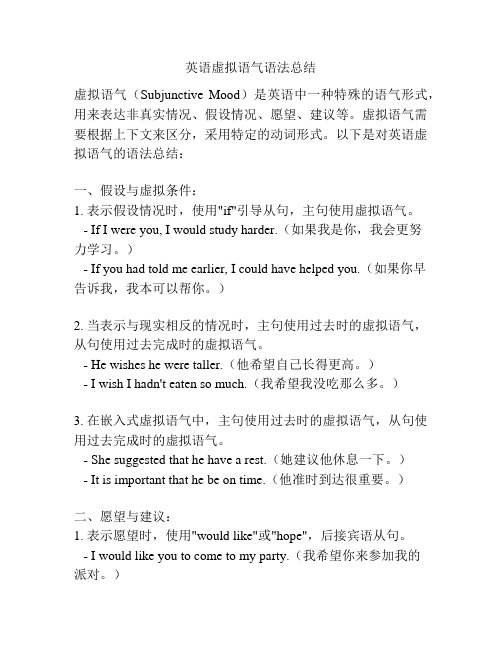
英语虚拟语气语法总结虚拟语气(Subjunctive Mood)是英语中一种特殊的语气形式,用来表达非真实情况、假设情况、愿望、建议等。
虚拟语气需要根据上下文来区分,采用特定的动词形式。
以下是对英语虚拟语气的语法总结:一、假设与虚拟条件:1. 表示假设情况时,使用"if"引导从句,主句使用虚拟语气。
- If I were you, I would study harder.(如果我是你,我会更努力学习。
)- If you had told me earlier, I could have helped you.(如果你早告诉我,我本可以帮你。
)2. 当表示与现实相反的情况时,主句使用过去时的虚拟语气,从句使用过去完成时的虚拟语气。
- He wishes he were taller.(他希望自己长得更高。
)- I wish I hadn't eaten so much.(我希望我没吃那么多。
)3. 在嵌入式虚拟语气中,主句使用过去时的虚拟语气,从句使用过去完成时的虚拟语气。
- She suggested that he have a rest.(她建议他休息一下。
)- It is important that he be on time.(他准时到达很重要。
)二、愿望与建议:1. 表示愿望时,使用"would like"或"hope",后接宾语从句。
- I would like you to come to my party.(我希望你来参加我的派对。
)- She hopes that the weather will be good tomorrow.(她希望明天天气会好。
)2. 表示建议时,使用"should"或"would rather"等,后接宾语从句。
- I suggest that you see a doctor.(我建议你去看医生。
虚拟语气的表达方式 - 改为:虚拟语气的表达形式

虚拟语气的表达方式 - 改为:虚拟语气的
表达形式
虚拟语气的表达形式
虚拟语气是一种用于表达假设、愿望、怀疑、命令等非真实情况的语气。
在汉语中,虚拟语气的表达方式可以通过以下几种形式体现:
1. 假设句型:在句子中使用“要是”、“如果”、“假如”、“要是不”等引导词,来表示一种假设的情况。
例子:
- 如果我是你,我会好好珍惜这个机会。
- 要是他不去参加聚会,我们就无法见面了。
2. 愿望句型:使用“但愿”、“希望”、“要是…就好了”等来表达一种愿望或希望。
例子:
- 但愿明天天气好,我们可以去爬山。
- 要是能赢得这场比赛,就好了。
3. 虚拟的心理活动句型:使用“如果…就好了”、“要是…就好了”来表达一种虚拟的心理活动。
例子:
- 如果我能回到过去,我一定会改变很多事情。
- 要是我有更多的时间,我就可以完成这个项目了。
4. 祝愿句型:使用“祝愿”、“希望”等动词来表达一种祝愿。
例子:
- 祝愿你们幸福快乐。
- 希望你能早日康复。
以上是虚拟语气的一些常见表达形式,通过运用这些句型和表达方式,可以更准确地表达非真实情况下的想法、愿望和假设。
请注意,文档中所引用的部分内容仅供参考,不能确认的内容不应进行引用。
高中语法专题解析虚拟语气

高中语法专题解析虚拟语气虚拟语气(Subjunctive Mood)是英语中一种特殊的语气,用于表示假设、愿望、建议、要求、命令等虚拟的情况或假设。
在高中语法学习中,掌握虚拟语气的用法是十分重要的。
本文将针对高中语法专题解析虚拟语气进行详细讲解。
一、条件虚拟语气条件虚拟语气用于表示与现实相反的假设情况,包括对现在和将来的假设。
其主要形式为:if + 条件从句 (Past Simple), 主句(would/could/might + 动词原形),例如:1. If I were a bird, I would fly in the sky freely.(如果我是一只鸟,我就可以在天空中自由飞翔。
)2. If it rained tomorrow, we would stay at home.(如果明天下雨,我们会呆在家里。
)需要注意的是,条件从句中的动词通常使用过去式形式,而主句中的动词则使用情态动词 would/could/might + 动词原形的形式。
二、虚拟语气用于表达愿望、建议、要求1. 表达愿望虚拟语气可以用于表达对现在或将来情况的愿望,常见的句型有:- I wish/If only + 主语 + 过去式:用于表达对现在情况的不满或遗憾的愿望,例如:"I wish I were taller."(我希望我个子高一些。
)- I wish/If only + 主语 + would/could/过去式:用于表达对现在情况的希望或期望,例如:"I wish you would come to my party."(我希望你能来参加我的派对。
)2. 表达建议虚拟语气可以用于表达对过去情况的建议,常见的句型有:- It's time/It's high time + 主语 + 过去式:用于表示现在情况应该采取的行动,例如:"It's time you finished your homework."(你该完成作业了。
虚拟语气的用法与常见句型
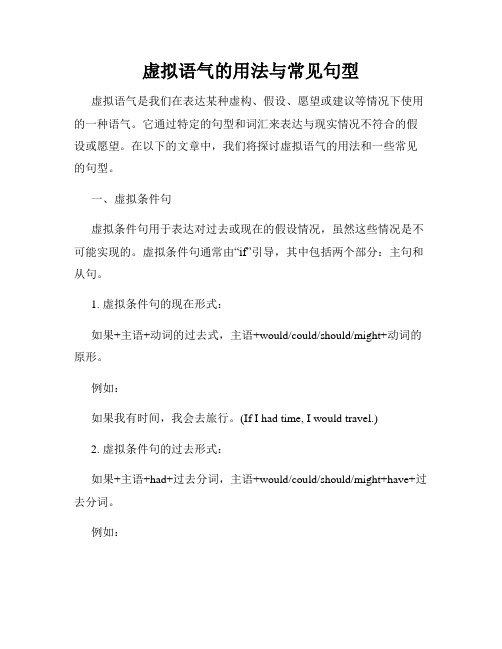
虚拟语气的用法与常见句型虚拟语气是我们在表达某种虚构、假设、愿望或建议等情况下使用的一种语气。
它通过特定的句型和词汇来表达与现实情况不符合的假设或愿望。
在以下的文章中,我们将探讨虚拟语气的用法和一些常见的句型。
一、虚拟条件句虚拟条件句用于表达对过去或现在的假设情况,虽然这些情况是不可能实现的。
虚拟条件句通常由“if”引导,其中包括两个部分:主句和从句。
1. 虚拟条件句的现在形式:如果+主语+动词的过去式,主语+would/could/should/might+动词的原形。
例如:如果我有时间,我会去旅行。
(If I had time, I would travel.)2. 虚拟条件句的过去形式:如果+主语+had+过去分词,主语+would/could/should/might+have+过去分词。
例如:如果我昨天去了那个聚会,我会见到他的。
(If I had gone to the party yesterday, I would have met him.)二、虚拟语气的用途虚拟语气除了用于条件句之外,还可用于表达愿望、建议、命令、让步等情况。
下面是一些常见的虚拟语气句型。
1. 愿望:(a) 现在的愿望:I wish (that) + 主语 + 过去式例如:I wish I were taller. (我希望我更高。
)(b) 过去的愿望:I wished (that) + 主语 + 过去完成时例如:I wished I had studied harder for the exam. (我希望我在考试前更努力学习。
)2. 建议:It is suggested (that) + 主语 + (should) + 动词原形例如:It is suggested that he (should) go on a vacation. (有人建议他去度假。
)3. 命令:It is important/necessary/vital + that + 主语 + (should) + 动词原形例如:It is important that you (should) arrive on time. (重要的是你按时到达。
- 1、下载文档前请自行甄别文档内容的完整性,平台不提供额外的编辑、内容补充、找答案等附加服务。
- 2、"仅部分预览"的文档,不可在线预览部分如存在完整性等问题,可反馈申请退款(可完整预览的文档不适用该条件!)。
- 3、如文档侵犯您的权益,请联系客服反馈,我们会尽快为您处理(人工客服工作时间:9:00-18:30)。
• 把下列的句子改成省略倒装句: • If you had taken my advice then, you would have got better results. • Had you taken my advice then, … • If he should take away my house, I would certainly fight him. • Should he take away my house, … • If I were as young as you are, I would study hard. • Were if as young as you are, …
注: 当从句中有动词 had, should, were, 可省略if, 并采用倒装形式. Had he seen you yesterday, he would have asked you about it. Should it (Were it to) rain, the crops would be saved.
• • • •
6. 在if only 开头的句子中 If only we had a car of our own! If only I hadn’t lost my dictionary! If only I could go abroad next year.
• 7.由as if , as though 引导 的状语从句和表 语从句表夸张的比喻和猜测时 • He works very hard as if he never knew tiredness. • It seems as if it were spring already. • “I remember,” she tells her children, • “ how wild his white hair looked as if it had been electrified.” • She cries as if her heart would break.
3. If it were to rain tomorrow, we ____________ would stay (stay) home all day. taken (take) my advice, you would 4. If you had _________ not have failed in the exam. 5. If you had followed my advice just now, would be (be) fine now. you________ 6. He hesitated for a moment before kicking the ball. Otherwise he____________________ would have scored (score) a goal. 7. Without the air to hold some of the sun’s heat, would be (be) freezing cold, too the earth at night ________ cold for us to live.
• 3. 用介词短语表虚拟(with, without, in, under, but for ) • 1) Without air, there would be no living things. • =If there were no air, there would be… • 2) Under the leadership of a less experienced person, the experiment would have failed. =If it had been under the …, the experiment… • 3) I would have lost my head in that position. • =If I had been in that position, I would have… • 4) But for their help, we could not have got over the difficulties. • =If it hadn’t been for their help, we could not have got…
一、动词填空用所给词的适当形式填空。 1. If I _____(be) you, I would do it in a were different way. 2. If I _________ had known (know) you liked would have bought chocolates, I _______________(buy) more for you yesterday.
虚拟语气句型及其表现形式
1.在由if引导的非真实条件状语从句中 1)现在虚拟. We would ask the teacher if he were here now. If he were not ill in bed, he might come to class.
主句谓语用would(could,should, might +do从 句谓语 用动词过去式 2)过去虚拟. If I hadn’t forgotten your telephone number, I would have called you last Sunday. 主句谓语用would(could,should, might +have done, 从句谓语 用had done.
3)将来虚拟 If I were to do it again tomorrow, I might do it in different ways. If there should be no water, there would be no life on earth. If it rained tomorrow, we would stay indoors. 主句谓语用would(could,should, might +动词原形,从句 谓语 用动词过去式,也可用were to /should+动词原形
2. 用连词or, otherwise, but, but that表虚拟
• I’m really busy, otherwise/or(, ) I would certainly go with you. • =I’m really busy. If I were not busy, I would certainly go with you. • But that/But I saw it, I could not have believed it. • If I hadn’t seen it, I could not have believed it.
Байду номын сангаас
二、翻译句子将下列句子译成英语。 1. 昨天我要知道你电话号码的话,就告诉你真相了。 If I had known your telephone number _________________________________ yesterday, I would have told you the truth _________________________________. 2. 如果我年轻10岁,我会从头开始的。 If I were 10 years younger, I would start all over again ______________________________________. 3. 明天我要去那里的话,我就带着我的女儿。 If I went/should go/were to go there tomorrow, _________________________________ I would take my daughter with me ___________________________. 4. 要是我早想到这一点,就不会做这样愚蠢的事情了。 If I had thought of it earlier, I wouldn’t __________________________________ have done such foolish things. _____________________________.
• Attention: • If I had studied at high school, I would have been admitted into a better college and I would be working in a better company now.
4. 当wish表难以实现的或没有实现的愿望时, 从句根据时间情况用虚拟结构 • I wish I knew her address. • How I wish I had been able to say the rules without a mistake! • I wish I could go home right now/tomorrow. 5. 在would rather +that 从句时 I’d rather you went home now. I would rather he had stayed at the hotel yesterday. I’d rather they left tomorrow.
